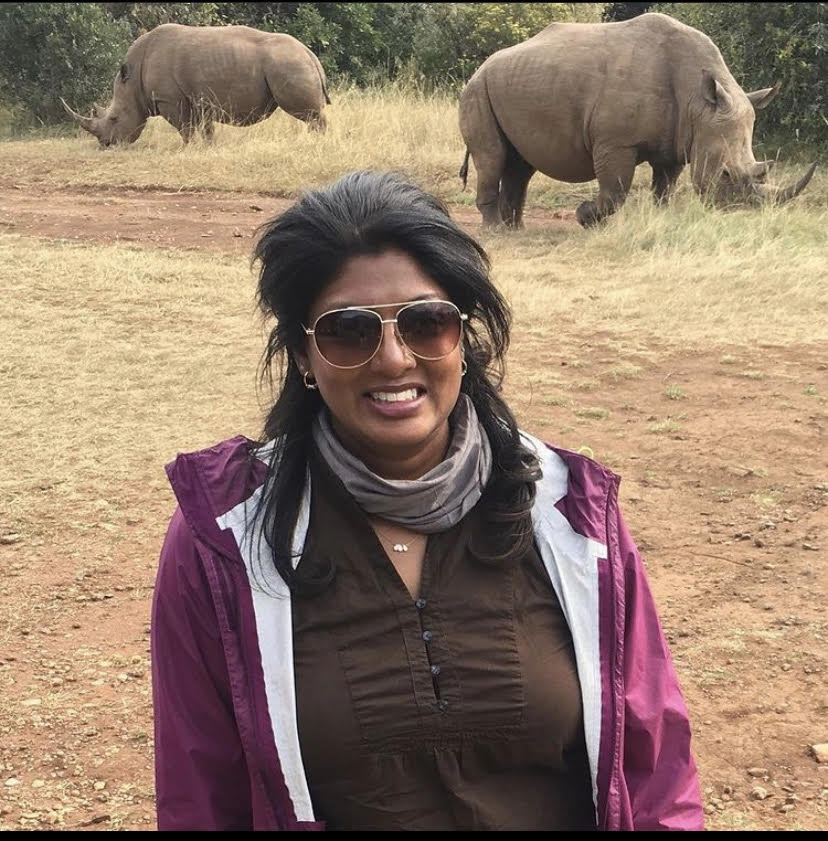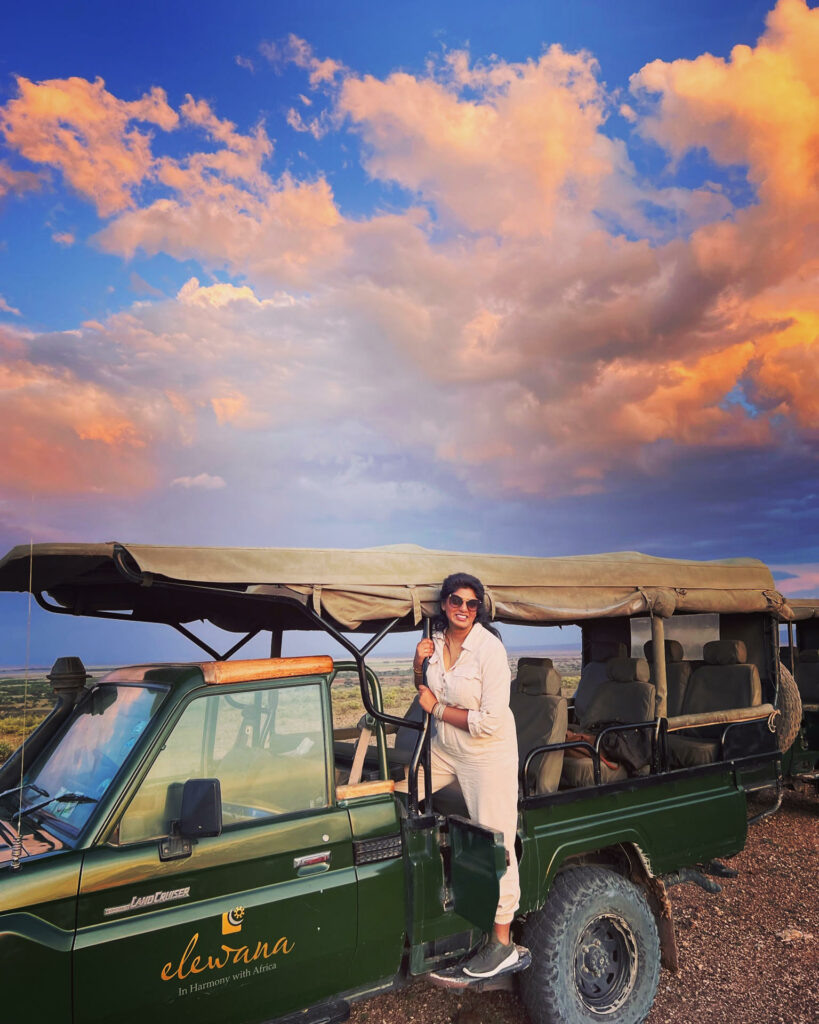In this article we explore my interviewee’s life-changing ask, her thoughts on Indian women’s attitudes about asking, and how she views asking differently at work and home. Adele Nandan is founder and chief experience officer of The JoYOUs Journey, a full-service travel company that matches philanthropy with tourism, bringing people closer to the individuals and communities they support. She provides Fortune 500 clients, nonprofits, family foundations, corporate foundations, and individuals with curated travel experiences in East and Southern Africa, India, the Middle East, and Latin America.
In February 2022, the lifting of pandemic-related travel restrictions enabled Adele and her clients to travel to Kenya, her first return to Africa in two years. Stateside, Adele is Major Gifts Manager for The Chicago Community Trust, a philanthropic organization.
Paul Quinn: Adele, when I saw that you have a travel business and also work as a fundraiser, I thought, Okay—she must have an Ask story!
Adele Nandan: And I do! In 2013, I worked for a nonprofit and was on a media trip to Uganda and Rwanda with my boss. When we were in Rwanda, a country I had fallen in love with having been there many times, there was a moment when my boss just looked at me and said, “You know, you kind of light up when you’re here. It’s not like you’re sulky back home or anything, but you’re a different person here. You should think about that.” I knew I had a strong love for the country, but I didn’t realize until she pointed it out that my whole demeanor changed when I was there.
Paul Quinn: It was generous of her to notice that about you and comment on it. She was paying attention.
Adele Nandan: Definitely. But living in another country isn’t something I had ever thought about. I am so family oriented and didn’t want to be so far away from my parents and sister. But within two or three days after we got back from that trip, I thought, What does it hurt to ask?
I think I wanted to ask soon to capitalize on the feeling we all had on that trip. I also know myself, and if I sit on something and think about it too long, I won’t ask. I will have talked myself out of it.
So, I went to my boss and said, “What do you think about me moving to Rwanda?”
And she said, “It makes total sense. You’re in East Africa 75% of the year. Rwanda could be your base. Present your numbers to me and let’s see if we can make it work.”
Paul Quinn: Sounds like she might’ve been setting you up for that ask when she suggested you “think about it?”
Adele Nandan: (nods) And she approved my move. That’s when I really wondered — can I do this? But everything just fell into place. Within two months of asking I was living there.
The whole process, including getting the support of my parents, was so easy. Normally, making a decision like that would be very scary and I would hesitate. But for some reason, to leave my family and move to a country by myself, I was not scared. There was no fear. It was just complete peace. I knew it was meant for me at this time in my life.

Paul Quinn: Where did you live?
Adele Nandan: I found a house in Kigali within the first two days I was there, more of a Western style house that had some of the same comforts I had in the US. The house was right across the street from the sister of the president [Paul Kagame], so there was security all the time. Luckily for me, in Rwanda they drive on the same side of the street as we do, so I felt comfortable getting around.
If I didn’t have the courage to ask if I could move there, I would be a different person today.
During that time, I really discovered my love for creating experiences for people where I would connect them with communities in Rwanda and other countries where they could give back to, but at the same time create the experience where they get to go on safari or gorilla tracking. I could put my special touches in the details and make it a memorable lifetime experience for them. And I knew that serving in this way was my passion.
Paul Quinn: How long did you live in Rwanda?
Adele Nandan: I lived in Rwanda for six months but traveled there five times a year between 2011 and 2016. In that time, I had built up so much courage to do all kinds of things. I never have fear about travel. I think it’s because I went to a war-torn country that had rejuvenated itself into this beautiful place. And I got to experience that and share it with people from my world.
I feel confidence about my travel business even though it’s hard because people aren’t yet traveling like they used to. And being an entrepreneur is hard, but I got the courage to take that step of faith to live in a country that is far out of my norm—and it has gotten me here.
And now, as a fundraiser with The Chicago Community Trust I ask all the time. You don’t get without asking, and you’re in the same place if they say no. It’s not like you’ve lost anything, and then you just figure out the next steps.
Paul Quinn: Is there any difference between asking in your professional and personal life?
Adele Nandan: It’s funny, because in my work life I can ask away, but in my personal life I’m not much of an asker. I definitely have a servant’s heart in both areas, so I give give, give, give. And I think it’s because of the love I have for friends and family. I don’t do any asking, and I probably should, but I just don’t. I like serving.
Paul Quinn: To what degree, if any, do you feel your reluctance to ask is cultural?
Adele Nandan: I think to a very large degree it’s cultural because Indian women are taught to serve. We’re taught to put the needs of our significant others before our own, especially if they’re male. And I think a high percentage of that [reluctance to ask] is because of my faith.
Paul Quinn: And it’s your Christian faith that inspires your servant leadership focus?
Adele Nandan: Yes. Giving is the example that my mom set for me, as an Indian woman and a woman of faith. She didn’t necessarily say it, but it’s how my parents’ dynamic was. It’s what I learned. And I notice in my relationship with my boyfriend that I don’t know if I want to be another way. Because I enjoy taking care of him, and I saw the joy that it brings my mom.
Paul Quinn: A lot has been written about male-female differences as being cultural differences. Having talked to many women for my blog and book and doing a lot of reading myself, it’s widely recognized that women are “natured or nurtured” to put everybody else first. For Indian women, then, it may just be a matter of degree. Would you agree?
Adele Nandan: Yes, and what we’re seeing today in the media, and how we’re trying to shift the cultures so that women are able to focus more on themselves, is wonderful. And it’s not easy. Sometimes I actually think it makes me uncomfortable, like, somehow, I’m not fulfilling my role. I don’t know.
Paul Quinn: What have you learned about asking as a professional fundraiser?
Adele Nandan: I’m a very relational person. I think the secret is building a strong relationship with the person you’re going to ask a gift from. And it’s them trusting you to know it’s not just about the money. You care about their ability to give and the reasons they’re giving. I find out what’s important to them and their family and the causes that resonate with them, whether global poverty or bridging the racial and ethnic wealth gap in Latinx and black communities. Many of the donors I’ve cultivated relationships with have become lifelong friends.
Paul Quinn: I’ve talked with many people who have turned client relationships into friendships. Is that the best of both worlds?
Adele Nandan: It really is. That one ask to move to Rwanda really changed my life in so many ways. My boss had said, “You’re really good at this. If you ever decide you want to make a business of it, let me know.” And when she left, the woman who replaced her said the same thing to me. All the travel I was doing eventually burned me out, and I left the company a few years later. I asked both of them what they thought about starting a travel business together, and they jumped aboard.
Paul Quinn: Are they still your business partners?
Adele Nandan: They went on to other things. But asking to move to Rwanda and then asking for their partnership, helped me discover and pursue my passion in life.
Paul Quinn: Anything else you’d like to add to this topic, Adele?
Adele Nandan: Just that I enjoyed the story about when you asked for more peanuts on the plane. On a recent flight to Kenya, when the flight attendant was clearing away our trays, my boyfriend asked her if he could have a second meal. He didn’t hesitate at all to ask. I told him that I would’ve never thought to do that. And when she came back with his meal—“Here you go!”—I was, like, Huh! And he said, “It’s because I’m kind.” And it’s true, he asked kindly!

Contact Adele Nandan at The JoYOUs Journey or LinkedIn.
Paul Quinn is author of a nearly completed book about asking as a life skill, which features portions of this content.

0 Comments